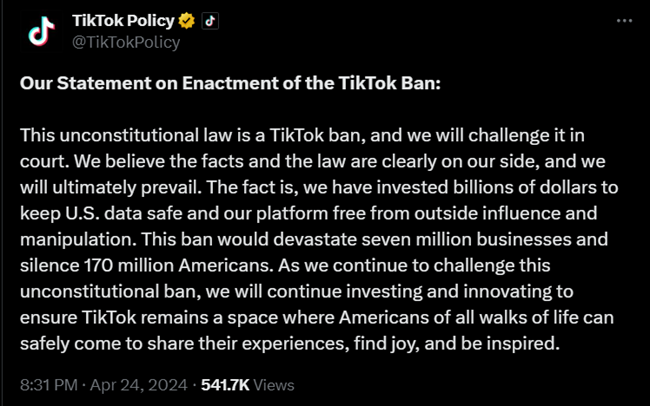
U.S. President Joe Biden has signed a bill into law that requires ByteDance, the Chinese parent company of TikTok, to sell its ownership of the app within the next nine months or face a ban.
The deadline can be extended by three months if necessary, with the condition that TikTok is sold to a U.S. company within a year. The bill received significant support in the U.S. Senate and was bundled with foreign aid to key American allies.
Reasoning Behind the Decision
Concerns have been growing regarding TikTok’s potential influence on U.S. elections and national security.
Some states had already started banning TikTok on government devices, citing fears that user data could be shared with Beijing or that the app could be used for propaganda and espionage.
Both Democratic and Republican lawmakers expressed worries about the Chinese government’s possible manipulation of TikTok through ByteDance.
Legislative Action and Senate Support
The bipartisan bill gives ByteDance nine months to sell TikTok to a U.S. company, with a potential three-month extension.
It prohibits ByteDance from controlling TikTok’s core technology, which tailors content to users’ interests, particularly appealing to younger audiences.
The bill’s passage in the Senate was facilitated by strategic political moves in the House, which pressured the Senate to address the TikTok issue sooner and extended the timeline for a potential deal.
Concerns Over Data Security
Lawmakers and intelligence officials are worried that TikTok’s ownership by a Chinese company could jeopardize the data of its American users. Chinese national security laws could compel companies like ByteDance to hand over internal information.
Despite TikTok’s assertion that it does not store U.S. data in China, concerns persist about potential Chinese government influence over the platform’s content.
Senate Statements
During Senate debates, Senator Maria Cantwell emphasized the bill’s aim to safeguard against foreign espionage and harm to Americans.
Senator Mark Warner highlighted the risks posed by foreign control of TikTok and expressed understanding for the concerns of young users who fear losing the platform. He assured that the legislation aims to protect national security rather than suppress voices, reported The Verge.
Response from TikTok
TikTok has condemned the law as unconstitutional and plans to challenge it in court. The company argues that it has invested significantly in data security and preventing outside influence on its platform.

The ban would affect millions of businesses and silence millions of Americans who use TikTok as a platform for expression and inspiration.
TikTok’s CEO, Shou Zi Chew, reassured users that the platform is not going away and expressed confidence in prevailing against the ban in court.
He criticized the law as an attack on American voices and emphasized TikTok’s contributions to the U.S. economy.
Future Developments
TikTok’s legal battle against the ban is expected to continue, with the company aiming to prevent its implementation.
As the situation unfolds, further developments are anticipated regarding the fate of TikTok in the United States.
